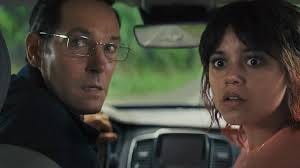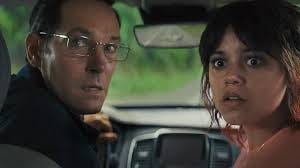Death of a Unicorn is one of those films that contains a basic premise that sounds so oddly appealing that it is easy to believe that the vast majority of the people involved with it agreed to sign on based solely on that logline alone. Unfortunately, it is also one of those films where it seems that all of the creative efforts went into devising that premises and there was nothing left in the tank to help see it through. The result is a film that is relatively watchable and occasionally amusing but it just lacks a much-needed final burst of inspiration that might have transformed it from a good idea into a good movie.
Elliot Kitner (Paul Rudd) is a lawyer for a massive pharmaceutical company run by the obscenely wealthy and terminally ill Odell Leopold (Richard E. Grant), who has summoned him to spend the weekend at his family’s sprawling compound deep in the Canadian Rockies with the promise that his fortunes could be secured if all goes well. As Odell stresses family above all else—at least in theory—he insists that Elliot’s college-age daughter Ridley (Jenna Ortega) accompany him on the trip. Although father and daughter have been slightly estranged since the recent death of their wife/mother, Ridley agrees to come but the buried tensions between the two begin to flare up during the long drive to casa Leopold. Before long, Elliot’s eyes drift from the road and they accidentally hit and badly injure what appears at first to be a horse. Upon investigating, it appears that the creature is—Spoiler Alert!—a genuine unicorn, complete with horn. Under the gun and frazzled, Elliot puts the creature out of its misery, splattering the two of them with its purple blood in the process, and then puts it in the trunk of his rental car before moving on.
Once they finally arrive, Elliot tries to keep it together while meeting with Odell, his glibly do-gooding wife Belinda (Tea Leoni) and his spectacularly self-absorbed son Shepard (Will Poulter), but when it seems that the unicorn is not quite dead, he is forced to reveal his find to the others. However, when it turns out that the unicorn’s blood seems to be an instant cure-all for everything from Ridley’s acne to Elliot’s eyesight to Odell’s terminal cancer and grinding its horn yields a powder more powerful than the finest cocaine, the newly-rejuvenated Odell and the other Leopolds are ready to exploit the unicorn in every imaginable way, convincing Elliot to side with them with the promise of millions to come. The only one hesitant is Ridley, whose art history training reveals that back in the old times, unicorns were looked upon as something quite different and infinitely more fearsome than their cuddlier contemporary persona. Inevitably, the others ignore her dire warnings about messing with the unicorn and, just as inevitably, they are soon born out when a couple of fully grown and very hostile examples arrive to search for their baby and to gruesomely dispatch anyone foolish enough to get in their way.
In essence, Death of a Unicorn is like a bizarre hybrid of Jurassic Park and Saltburn with overt satirical shots at the Sackler pharmaceutical fortune and wild burst of gore, complete with innards quickly and gorily turning into outtards, thrown into the mix for good measure and for maybe the first half, it sort of works on its own bizarro wavelength. As the troubled father and daughter, Rudd and Ortega hit the comedic hearts supplied by writer-director Alex Scharfman while at the same time carving out a convincing familial bond that stands out against the film’s loonier aspects. Even better is Grant as the Leopold head, whose philanthropical mindset is discarded the moment that his prognosis is no longer terminal—at one point, you can practically see his body responding as his sense of greed and avarice returns—and Leoni and Poulter are quite funny as well as his equally venal kin. The satire is not exactly subtle, of course, but it does inspire some big laughs here and there and when the full-sized unicorns arrive to wreak havoc on everyone, the results are amusingly gross at first.
“At first” being the operative words, because the trouble is that by the time the halfway point arrives, it becomes apparent that Scharfman has nothing else new up his sleeve that might enliven the later innings by sending the narrative off in new directions. Instead, he basically rehashes the points he has already established—Ridley’s distaste at her father’s pliable ethical bearings, Elliot’s being torn between doing what is right and what he thinks is right for his daughter, the arrogance of the Leopolds and their ability to find new and appealing ways to misuse the unicorn’s gifts for their own self-internet and the sight of the adult unicorns tearing the cast into tiny bits—over and over until the story finally tries to end on a beat of absolute sincerity that it never quite earns. Although the performances are always kind of fun, they all become increasingly one-note as things progress because none of the cast have been given a different gear to shift into and the pacing of the material becomes wildly uneven to boot. As for the bloodshed, it is certainly plentiful but even that gets a bit repetitive after a while and is undercut further by the fact that the unicorns doing the damage look less and less convincing—and I know that they aren’t meant to be realistic per se—the more that we see them.
There are times when Death of a Unicorn plays like one of those intentionally absurd sci-fi/horror pastiches that are produced cheaply to go straight to video or basic cable stations that inexplicably got pronounced upgrades in the casting and budgetary departments but not in regards to the script. It has been made with just enough skill to keep you watching it in the hopes that it might find its way towards paying off in the end but not enough to actually turn that corner. It has its moments—particularly the ones in which Grant takes center stage—but in the end, it will inspire little more than shrugs from viewers, which is about the last reaction one might reasonably expect to have towards a movie about unicorns slaughtering their oppressors.




